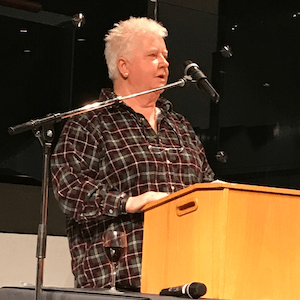 “There ain’t no cure for loving crime fiction,” said Val McDermid in her keynote speech, which opened the Iceland Noir festival in Reykjavik this evening. In an eloquent talk, she outlined – in great depth – a range of parallels between British crime fiction and Nordic Noir, while at the same time looking back on her 30-year career as a crime writer.
“There ain’t no cure for loving crime fiction,” said Val McDermid in her keynote speech, which opened the Iceland Noir festival in Reykjavik this evening. In an eloquent talk, she outlined – in great depth – a range of parallels between British crime fiction and Nordic Noir, while at the same time looking back on her 30-year career as a crime writer.
She recalled re-reading her grandparents’ copy of The Murder at the Vicarage by Agatha Christie – one of only two books in their house – and looked back on her discovery of Martin Beck, when she found a translated copy of The Locked Room by Maj Sjöwall and Per Wahlöö. Val McDermid also praised fellow Scot William McIlvanney for his Laidlaw series.
What’s important, she said, was how the Beck and Laidlaw stories carried with them a real sense of the societies they were set in, and the problems of the day. Crime writers in Scotland have been part of the national conversation about the country’s identity during the ongoing push towards greater self-determination. There’s a strong parallel with Iceland, she said, also a small country on the edge of Europe, continually examining its identity in a complex world.
Val was introduced by Britain’s ambassador to Iceland, Michael Nevin, who professed his own love for crime fiction. The talk concluded an academic conference entitled Noir in the North, held at Reykjavik University, and at the same time conveniently opened Iceland Noir.
Icelandic new blood
The first Iceland Noir panel session introduced four brand new Icelandic authors, whose work is yet to be published in English. English author and Iceland Noir organiser Quentin Bates quizzed the writers on their first books, each of which sounds fascinating.

Left to right: Quentin Bates, Hildur Sif Thorarensen, Ingvi Thor Kromaksson, Oskar Gudmundssen and Kristjan Atli Ragnarsson.
Medical student Hildur Sif Thorarensen explained how her debut novel was inspired by a real-life vampire someone told her about in Oslo. Her book features a criminally insane serial killer stalking the Norwegian capital, where she studies, but also offers up a good deal of humour.
Pushing things to extremes, justice and vengeance were three of the themes coming through as the authors talked about their work. By day Ingvi Thor Kormaksson works in Reykjavik’s library and has a good knowledge of the Icelandic literary scene. By night, he has been writing The Night Step, which retells a conversation between two recovering alcoholics. One explains how he and his friend were put into barrels full of cod liver when they were boys, and later took revenge on their tormentors. Of course, this has unexpected repercussions.

Nordic House, the Iceland Noir venue.
Oskar Gudmunsson began writing in response to his 50th birthday. Already a painter, he wanted to strike out in a new creative direction and has written Hilma. It was inspired by an article he read about a bullied child who admitted, “I dream about killing them.” The book is said to be as pacey as a Jo Nesbo novel. He wrestled with the notion of having multiple deaths in an Icelandic setting. There are few murders in the country, and killers don’t get far. “This is an island, there’s sea all around. You can’t escape to the next state,” he explained.
The fourth author to speak was Kristjan Atli Ragnarsson, a self-confessed writing addict and graduate of the creative writing courses at Reykjavik University. His novel is set 30 years in the future, when the global systems we take for granted today have collapsed. Isolated Iceland has turned into a lawless society, ruled by gangs. When a girl disappears, it’s up to her family to find her and prevent something terrible from happening. One of the biggest influences on this one was The Children of Men by PD James – if you liked that one, watch for Ragnarsson’s novel to appear in English.
Finally, great news for another Icelandic author. Lilja Sigurdardottir has landed a two-book deal with Orenda – at last English-speaking audiences will be able to enjoy her work.
More from Iceland Noir tomorrow.








